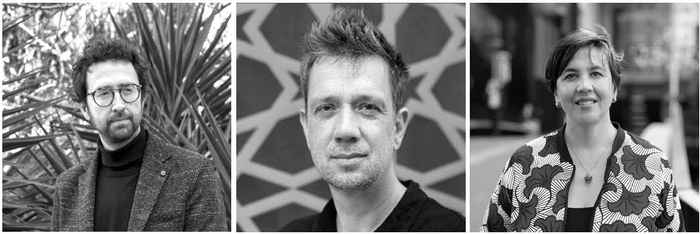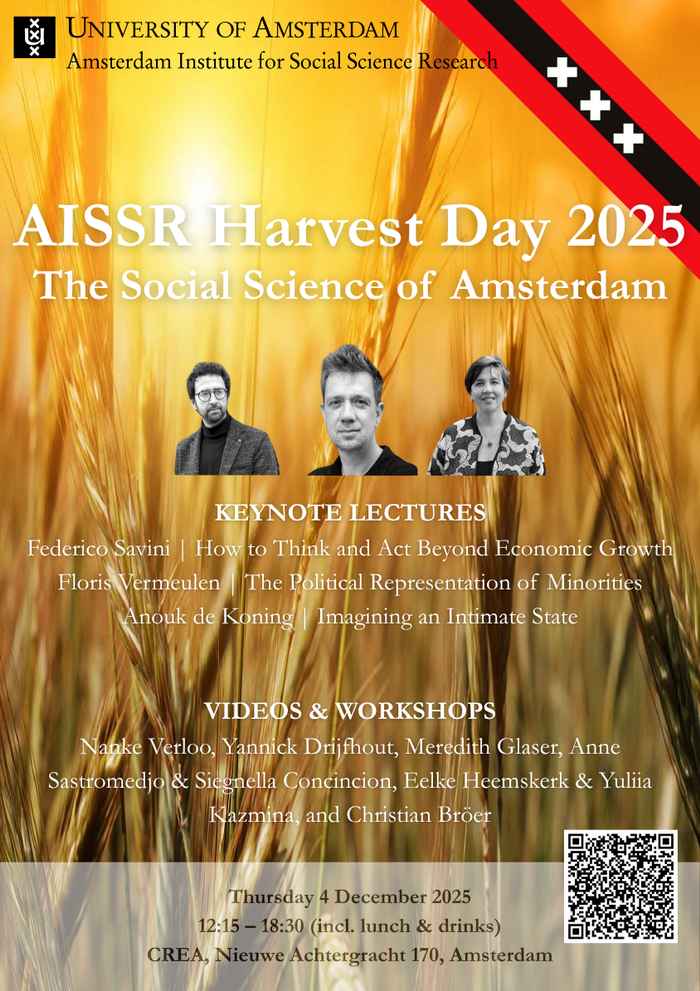AISSR Harvest Day 2025
The Social Science of Amsterdam
- Date
- 4 December 2025
- Time
- 12:15 -18:30
AISSR Harvest Day 2025 | The Social Science of Amsterdam
Each year, the AISSR brings together researchers, policymakers, students, community organisations, and other stakeholders to share insights from our work, the “harvest” of social science research.
This year’s edition focuses on social science research of, with, and for our city. What can different methods and disciplinary perspectives teach us about Amsterdam? What are the most important trends and challenges? How can researchers work with local stakeholders?
Keynote lectures
Three AISSR keynote speakers will present their research projects on Amsterdam, followed by conversations with stakeholders in the city:

Federico Savini | How to Think and Act Beyond Economic Growth
Degrowth has become a buzzword in environmental economics as well as a trigger for political controversies in urban politics.
This keynote lecture will explain the essentials of the degrowth project, in the context of cities and urban affairs.
What does degrowth means for cities? What are the spatial politics of degrowth? The presentation will provide a concise perspective to these questions and open a debate on the political challenges of rethinking cities in a truly sustainable and just way.
Aftertalk
With Zita Pels, alderwoman / deputy mayor (wethouder) in the City of Amsterdam. With portfolios including sustainability, energy transition & circular economy and public housing (volkshuisvesting).
Floris Vermeulen | The Political Representation of Minorities
Since the early 1990s, political scientists at the University of Amsterdam have examined the civic and political participation and representation of minorities in the city. A local representative democracy functions optimally when all citizens can participate, are heard, and feel represented.
Yet we know that those who are most politically engaged and satisfied rarely mirror the full diversity of the population. Political influence is unevenly distributed, and citizens with an immigration background consistently report feeling less represented than citizens without one. This also holds for Amsterdam, a city of minorities, where more than half of the population consists of immigrants or children of immigrants.
In this keynote, Floris Vermeulen presents, on the basis of his own research and that of colleagues, the long-term development of minority political representation in Amsterdam and ask what these patterns reveal about the state of local democracy today.
Amsterdam is often considered a unique case: on paper, access to the political system is relatively open, and institutional barriers to minority representation appear low. Why, then, do we observe growing participatory inequalities? And how is it possible that voter turnout in some outer-ring neighbourhoods has fallen below 20%, while turnout in affluent central neighbourhoods sometimes exceeds 90%? And what are the consequences of this for the political representation of minorities in Amsterdam?
Aftertalk
With Younes Douari, co-founder of UNSEEN & Represent Jezelf where he focusses on creating tailored campaigns for organizations targeting Gen-Z and Millennials.
Anouk de Koning | Imagining an Intimate State
Across the social domain, the imagined terrain of social policies in the Netherlands, policy makers have embraced an integrated, collaborative, and area-based approach. They seek to craft a mode of governance and welfare provision that activates, responsibilizes, and empowers citizens, inspired by a vision of a collaborative, intimate state and a more self-reliant and emboldened society. This is not the classical state imagined as distinct from and above society, but one positioned as a partner among many, embedded within local social worlds.
In practice, this vision takes shape through participation meetings, key-person networks, area-based policy officers, and social neighborhood teams. Yet the minutiae of organizational forms and forums tell only part of the story. As Benedict Anderson reminds us, political formations must be imagined, and technologies and administrative structures are central to that imaginative work.
Moreover, such imaginaries must be made real in everyday interactions. How, then, is the collaborative, intimate state made thinkable and compelling—and how does it become credible as a way to live and feel? This keynote lecture examines the work of imagination as it seeks to propose, and make persuasive, this new political formation.
Aftertalk
With Sandra Bos, director Burennetwerk. A non-profit/improvement initiative in Amsterdam that tries to strengthen neighborhood ties by connecting people who want to help (“goede buren” = “good neighbours”) with local residents who have small, everyday needs.
Interactive Workshops
In six interactive workshops, AISSR researchers and their collaborators discuss how their research helps to understand and address challenges. After watching six short videos that highlight the different ways in which researchers engage with the city, attendees can attend two 40-min workshops:
- Nanke Verloo on citizen participation in local decision-making
- Yannick Drijfhout on activism and social movements in Amsterdam-Noord
- Meredith Glaser on urban cycling and sustainable mobility
- Anne Sastromedjo & Siegnella Concincion on combining PhD research with municipal work
- Eelke Heemskerk & Yuliia Kazmina on data science collaborations with the City’s Research & Statistics Office (O&S)
- Christian Bröer on stress and time in Amsterdam families.
For who?
The AISSR Harvest Day is an open and inspiring event for researchers, students, policymakers, practitioners, and community partners — anyone interested in how social science helps understand and improve life in Amsterdam.
Program
| 12:15 – 13:15 | Lunch & coffee – CREA Music Hall |
| 13:20 – 13:30 | Opening by Academic Director Justus Uitermark |
| 13:30 – 14:05 | Keynote Federico Savini • Aftertalk: Zita Pels |
| 14:05 – 14:40 | Keynote Floris Vermeulen • Aftertalk: Younes Douari |
| 14:40 – 15:00 | Coffee break – CREA Music Hall |
| 15:05 – 15:40 | Keynote Anouk de Koning • Aftertalk: Sandra Bos |
| 15:40 – 16:05 | Videos The Social Science of Amsterdam |
| 16:10 – 16:50 | Workshop round I |
| 16:55 – 17:35 | Workshop round II |
| 17:35 – 18:35 | Drinks & snacks – CREA Music Hall |
We look forward to welcoming you for a day of ideas, conversations, and connection!
